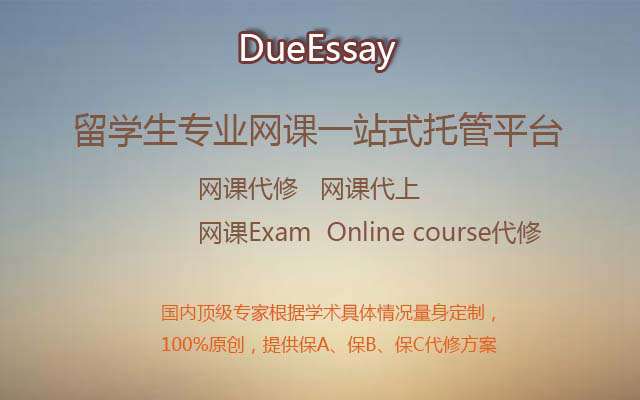
essay高分写作技巧_高分学霸原创代写
发布时间:2020-06-23
唯一网址:www.mingxinwrite.com留学生代写平台,是一家专业高品质的论文代写机构,拥有10年的代写经验,只用高品质的代写水平为您服务,assignment,essay,网课代修,我们只保A保B,为您的学业保驾护航,如果您对自己的论文水平不太自信,可以直接找我们客服咨询。

一,Steel thyself 锻炼自我,
迎接挑战Unlike expository writing that explains something in great detail, persuasive writing postulates at length on a specific subject. It claims to be the last word on the subject, or the first defensible one. The goal of the writer and the purpose of his paper is not to inform another person’s mind; it is to change a person’s mind. However, a writer’s assertion of final authority can run up against a reader’s assertion to the contrary. Therefore, persuasive writers should expect push-back.论说文不像说明文,说明文解释详细,论说文则以充份的篇幅讨论特定主题、发表有力的总结,或率先提出质疑。论说文的目的并非说明资讯,而是改变他人的想法。然而,由于作者的最终主张可能与读者牴触,因此读者可能反弹。If you are a shrinking violet, persuasive writing is not your garden. Persuasive writers do not mince words. They write using confident, charismatic phraseology that speaks with unqualified authority. Some readers are likely to respond in kind (even professors, who nonetheless should grade a paper on its merits rather than its conclusion) and a writer should not be intimidated by it. Rather, he should inoculate himself in advance by expecting scholarly disagreement.如果你生性害羞,论说文就不是你表现的舞台。写论说文时不能吞吞吐吐,遣词用字应该充满自信与魅力,语调威严。若遇到读者以牙还牙(教授也可能如此,不过教授应该根据文章内容评分,不应只看结论),你不能就此退缩,应该事先调整心态,准备面对不同的学术意见。The same high level of professionalism is demanded of every writer, whatever the purpose of his paper. Yet a paper that argues it represents prototypical thinking carries the extra burden of being potentially controversial. Its argumentation could ignite additional scholarly argumentation. Therefore, a persuasive writer should prepare his paper with meticulous care and also prepare himself against strong responses that seldom come to writers of straight-forward exposition.无论写作何种学术文章,都应该展现同样的学术专业,然而一篇文章如果宣称自己的论证具有代表性,就额外多了争议性,其论证可能引发更多的学术论证。因此,写作论说文时,应特别仔细谨慎,并自我锻炼,以备面临直截了当的说明文不会引起的强烈反弹。
二,Believe 宣示信念
More so than some writing projects, persuasive papers must be grounded in conviction. That is, having academic interest in a subject is not sufficient commitment to a written argument, if convincing a reader is the goal. A persuasive writer must believe a thesis to be true, because some readers surely will not. Merely striking a supportive stance—posturing, in a word—is not persuasive, because insincerity inevitably leaks through to undermine any points being made.
相较于一般的文章,论说文更注重可信度。如果要写论说文说服读者,仅仅对主题抱持学术兴趣还不够;文章要有说服力,作者必须信奉自己的论点,因为有些读者必然有不同意见。只在立场上表示同意(也就是表态)无法叫人信服,因为言不由衷的态度往往会在文章中流露出来,削弱各种论点的力道。
So the required mindset is belief. You must openly believe what you are espousing in a persuasive paper. This is difficult for some writers, who have been taught the virtue of objectivity and academic distance in their expository writing. While emotional appeals are not appropriate, fervent factual espousal of a doctrine, policy, or finding is absolutely OK. Stridency can be a turnoff, but resolute testimony is not. Do not be of two minds about your subject.
所以态度上一定要充满信心,在写论说文时公开对拥护的论点表达信念。这对有些人来说并不容易,因为他们受过写说明文的训练,信奉客观与学术距离。尽管诉诸情感并不恰当,但根据事实,热切拥护一项主义、政策或发现,则无伤大雅。咄咄逼人让人退避三舍,但坚定的声明不会引起反感。你对主题的立场不能摇摆不定。
Having and expressing convictions in a paper should not be a stretch for a serious academic writer. After all, you are immersing yourself in academics precisely because you appreciate the power of the mind. Papers written to persuade bring all of that power to bear including the considerable energy unleashed by imagination and fresh thinking. Combined with courage, these intellectual assets are the tools for changing the world, one mind at a time. Believe you can.
对认真的学者来说,在文章中展现信心应该不难,毕竟你献身学术,正是因为你懂得心智的力量。论说文正是用来展现心智的力量,包括由想像力与崭新思维释放的强大能量。这些智慧如果能结合勇气,就能用来逐渐改变世界。要相信自己做得到。
三,Be rational, not emotional 保持理性,拒绝感性
Persuasive writing is neither art nor science, but it is a step beyond simple argument. Arguments typically are loud affairs with more heat than light generated on both sides. Persuasive writing eschews all that in favor of reason, logic, and concentrated communication. Nowhere in the formula is there resort to emotion. Fervor is acceptable, even passion, but the strong feelings are dispassionately structured in a way that culminates in, it is hoped, an indisputable conclusion.
撰写论说文既不是一门艺术,也不是一门科学,这种写作超越一般争论。争论通常很激烈,并且双方最后往往难有定论。论说文的撰写则避开这类激辩,代之以理性、逻辑,讨论紧扣主旨,写作模式也不诉诸情感。虽然可以接受热情、甚至是激情,但会冷静地组织、表达强烈的感受,以期归结出不容置疑的结论。
The persuasive writer is first of all a thinker. All academic writers draw upon intellect, of course, but to really persuade, a writer calls both upon raw knowledge and informed opinion. This comes together in something called reason. To be rational—that is , to ground an argument in reason—is to assert truths while defending against untruths. A persuasive academic paper introduces a premise with sound reasoning at the same time it anticipates and rebuts counterarguments.
写作论说文前,应当要懂得思考。当然,所有的学术作家在写作时都需要运用自己的才识,但要真正具备说服力,就得同时利用原始知识以及基于可靠资料来源所作出的见解。综合此两项因素即为理性。论证要合理,亦即以理性为基础来提出论点,作者就得拥护真理,同时抵御不实之言。学术文章要有说服力,必须根据合理的推论提出假设,同时也能预料到反对意见并作出反驳。
Before the writing, then, comes the thinking. There can be no holes in it. Writers who lightly survey an issue or perform slipshod research are guilty of hubris. Compelling words will not persuade unless grounded in rational evidence. Without such evidence, a paper lacks intellectual standing. It is a mere popular pamphlet, rather than a treatise. Persuasive writers challenge convention. If they want others to support them, they must rationally support themselves.
因此写作前必须先思索文章可能的漏洞,若作者对议题调查不足或研究草率,就犯了傲慢的毛病。只有以合理的证据为基础,文字叙述才具有说服力。缺乏证据的文章在理智上会站不住脚,这样的文章仅仅是市井小册,而非专业论述。论说文的作者挑战常规,如果希望获得他人支持,自己的论点得先有理性支持。
四,Give proximate support to key points 尽力支持文章论点
Persuasion is not a function of volume. That is, he who speaks the loudest is not necessarily the most persuasive. While a loud would-be persuader commands attention, he does not usually command respect. Nor does his noise penetrate much beyond the ears to the heart and mind of those listening. In persuasive writing, the same principles apply: Success comes not in what you say, or how “loudly” or strenuously you say it; it comes in effectively supporting what you say.
要说服别人,可不是只有大声就好。说话最大声的,不见得就是最有说服力的人。当一个人提高音量,企图引起他人注意时,他的行为通常不会得到别人的尊重,而他所说的话也不过是耳边风,无法说到听者的心坎里。相同的原则也适用于撰写论说文:写作成功的要素不在于文章内容,也不是写得多「大声」或声嘶力竭就行,而是要能充分支持你的论点。
A fundamental principle to follow in writing a persuasive paper is to support essential points in proximity to the points. What too often happens is that a writer makes a point and then pivots away to declare another truth, eager to reveal his full argument without interruption. Yet writers don’t have to worry about being interrupted. They need only hold a reader’s attention. When they spin away too fast, even to a parallel thought, they forfeit the chance to make a point indelible.
撰写论说文时,所应遵循的基本原则为尽力支持文章论点。写作常见的一个错误,就是在提出论点后,马上偏离主题提出下一个论证,急着一口气列出所有的论点。其实并不需要担心行文停顿,而是要吸引读者的注意力。如果行文过急,就算是对仗的结构也会失去论点让人留下不可磨灭印象的机会。
It makes great sense sometimes to summarize the various points of an argument right up front, and then to summarize them again near the end. Yet in the body of the paper, the significant points stand along and each should be buttressed with evidence of its correctness . Often the weakest point needs the most supporting evidence to offset its intrinsic weakness. By supporting each point immediately after making it, readers will more likely be persuaded, one point at a time.
有个很好的撰写方式,文章一开始即囊括各论点,然后在文末再次总结。但在内文部分得分别论述各个重点,同时辅以论据,证明作者看法的正确性。最弱的论点通常需要最具说服力的论证支持,以弥补论点本身的不足。倘若在提出论点后立即提出支持论证,将更容易逐点说服读者。
五,Anticipate and address objections 对相反论点的预测和应对
Knowing your argument and solidly making and supporting it are absolutely essential to successful persuasive writing. A writer cannot persuade another of something if the writer doesn’t believe it himself or doesn’t provide good reasons for his belief. Yet it is almost as important to understand an opposing position and to be able to express it in the course of disputing it. This is known as “straw man” rhetoric and if handled deftly can serve to buttress the writer’s position.
了解并扎扎实实地支持你的论点,对于撰写成功的论说文而言是不可或缺的。如果作者本人都不相信自己的说法,或者是无法提供好的理由来使人信服,这样的写作可无法说服他人。另一方面,对于写作同样重要的是能了解反方意见,并成功地在论证过程中提出反对意见。这就是「稻草人修辞」(straw man rhetoric),如果处理得当,能替作者的论点加分不少。
For example, if a writer’s position is that the sun rises in the east, he must acknowledge that some believe it rises in the west. He should state the opposing view without sarcasm or other pejorative language. To do otherwise is disrespectful and diminishes the writer’s own standing in the eyes of a reader. However, having given the alternate view, the writer then can pick it apart using whatever tools he has at his disposal—contrary evidence, witness testimony, scientific reports.
例如:如果一位作者的论点是「太阳自东边升起」,这位作者也得知道有人认为太阳自西边升起。所以在写作的同时,他应该以不带讽刺或轻蔑的语气,来陈述相反论点。如果不这么做,作者等于是犯了无礼的毛病,也降低了自己的论点吸引读者注意力的机会。不过,在提出相反论点的同时,作者有权选择采用任何方式──如援引相反证据、目击证词、科学报告等──来驳斥反面意见。
If the stature of an opposing argument is reduced this way, two goals are reached. First, the weakness of the opposing argument is exposed at the same time the strength of the writer’s position is highlighted. Two birds… one stone. Second, by anticipating and addressing objections, blowback is minimized. Opponents cannot effectively respond using rationale the writer has already addressed. They must come up with new arguments. That’s effective persuasive writing.
利用这种写作手法来减弱相反论点的力度,会达到两个目标。首先,在暴露出反方论点的弱点时,也同时强调了作者论点的力度。这可是投一石…得二鸟呢。另外,对反对意见作出预测和应对,能将反对的冲击力降到最低,使得对手无法有效地利用已经被提出的反面论据,必须提出新的说法。这就是有力的论说文写作。
六,Finish with energy 持续不懈地支持论点
Argumentative writing is, almost by definition, energetic. More so than some academic papers, it is not in tone or substance a laid-back exercise in writing. While presentation of the subject must be logical and methodical and be constrained by the rules of academic discourse, the writing nevertheless must have an underlying intensity to it. After all, the object is to persuade someone to embrace a conclusion advanced by the writer and this cannot be done without expending effort.
撰写论说文(argumntative writing) 就如字面上的意思,必须够力(energetic)。和一些学术论文不同的是,论说文在语气或实质上都不是随性的写作。虽然介绍主题必须合乎逻辑、有条理并严守规则,但写作内容仍须具备内在强度。毕竟文章的目标是说服读者接受作者提出的论点,而这并非轻易就能做到的。
So it is important to stay resolutely on point with an argument and to not exhaust support for the argument before the paper’s end. A race horse can run a magnificent race and be far ahead in the final turn and still lose the race because of poor pacing . Similarly, an argumentative paper must still be strong in substance and surprising in presentation right up through its conclusive paragraphs. Having the last word in an “argument” requires planning and intellectual stamina.
因此,紧咬主题非常重要,并得要通篇支持论点。这就像参加盛大的赛马比赛一样,一路维持领先的马,在最后可能还是因步调问题而输了比赛。同样地,论说文必须通篇维持有力内容和高潮迭起的呈现手法。而维持文章的「argument」(论点)则必须计划详尽且保持一贯的力度。
“Energy” is an elusive quality in a persuasive paper. It has nothing to do with the number of words used in the paper, nor to the brashness of a viewpoint. Rather, an energetic argumentative paper is a focused one. It is unremitting in making the case for a point of view. It is not marred by tangential, distracting passages. It is lean and purposeful. While it is courteous in its language, it is makes no attempt to disguise its rejection of opposing views. And it is that way clear to the end.
「energy」是论说性质的文章中难以理解的一个概念。文章的力度与字数或观点的直白程度无关。相反地,有力的文章是集中的,能持续不懈地重述论点,不受周遭或其他分散焦点的概念影响。文章论点必须一致且具目的性。维持文字谦逊的同时,也不应隐藏对相反意见的摒弃。而这正是维持通篇论点一致的不二法门。






